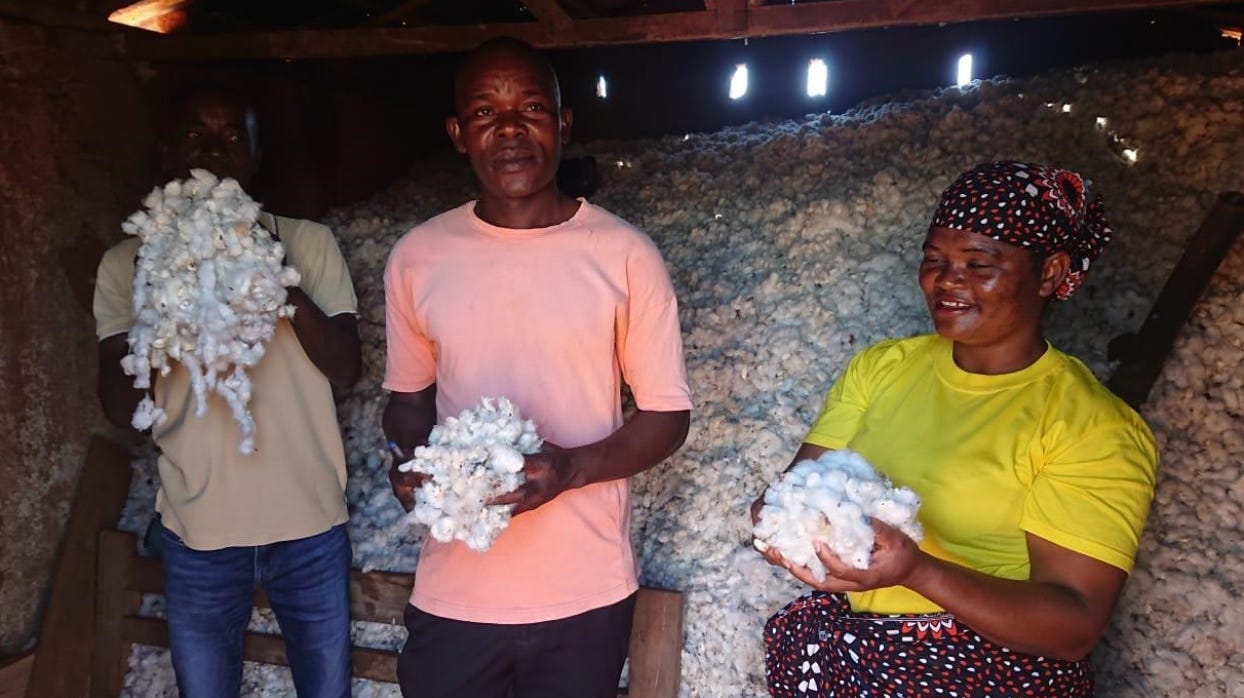TrustAfrica Pushes for Reform, Marking World Cotton Day
The efforts by TrustAfrica and its partners offer valuable lessons for other cotton-producing regions grappling with similar challenges.
LILONGWE, Malawi — With cotton harvest complete and farmers tallying their yields across Southern Africa, TrustAfrica is marking World Cotton Day on Oct. 7 with renewed calls for policy reforms and innovative solutions to address the persistent challenges faced by smallholder producers in the region, writes Winston Mwale.
The commemoration comes as advocacy groups intensify efforts to ensure fair value distribution in the cotton sector, which remains a crucial source of livelihood for millions of African farmers despite persistent obstacles.
"For things to work, for business to work, it also has to work in an environment where the policies are responding to the challenges that farmers are facing, but also where the cost of doing business in the different countries is lessened," said Beatrice Makwenda, Programme Officer at TrustAfrica.
Under this year's theme "Cotton for Good," organizations like TrustAfrica are collaborating with stakeholders in Mozambique, Malawi, and Zambia to advocate for equitable practices throughout the cotton value chain.
PUSH FOR POLICY REFORM
In Zambia, a significant focus has been on reforming the outdated Cotton Act of 2005.
"We've been working together with the cotton stakeholders to reform and review the current Cotton Act," Makwenda explained.
"In that regulation, there are calls for development of pricing mechanisms that really would allow the farmer to not just be a price taker, but a price setter as well."
The push for reform comes as farmers grapple with multiple challenges, from climate change to market access.
Makwenda emphasized the urgency of addressing these issues: "The challenges that the farmers are currently facing to do with access to good quality seed, to do with access to better markets, to do with engaging in better marketing arrangements, they have to be addressed."
MULTI-STAKEHOLDER APPROACH
Since 2021, TrustAfrica has been implementing the Reclaim Sustainability Program, focusing on enhancing inclusivity in the cotton value chain.
A cornerstone of this initiative has been the establishment of multi-stakeholder platforms in Zambia and Mozambique, bringing together farmers, ginning companies, government ministries, and regulatory bodies.
"These platforms have been very instrumental in taking on some of the advocates' agenda around reforming the cotton regulation," Makwenda said.
She stressed the importance of collective understanding and problem-solving: "First of all, to really understand each one's viewpoints, perspectives and challenges, and how collectively they can also address these challenges and move the sector forward."
DIGITAL INNOVATION AND CHALLENGES
As the sector evolves, digital innovation has emerged as a potential game-changer, though accessibility concerns remain.
"Digitalization is a catalyst and to an extent an equalizer," Makwenda noted.
"With digital tools, farmers make well-informed production and marketing decisions — more in this age of climate, with access to weather information."
However, she cautioned against passing the costs of digitalization onto farmers, emphasizing that these tools should enhance, not burden, agricultural practices.
DECENT WORK GUIDELINES
In a parallel effort, TrustAfrica is collaborating with Zambia's Ministry of Labour to develop comprehensive, decent work guidelines for the sector.
"There are different levels of understanding of decent work," Makwenda explained.
The guidelines address "fair wages, fair income, the safety of workers, and the freedom to engage and associate."
The initiative reflects a growing recognition that sustainable cotton production must prioritize workers' rights and well-being alongside economic considerations.
GLOBAL MARKET DEMANDS
The push for reform coincides with increasing global demand for traceable, sustainably produced cotton.
Digital tools are proving invaluable in this context, allowing for "robust producer databases which can easily be linked to service providers and break the exclusion chains," according to Makwenda.
This trend towards transparency presents both challenges and opportunities for African cotton producers.
While meeting international standards may require significant adjustments, it also opens potential new markets for farmers who can demonstrate sustainable practices.
REGIONAL COOPERATION
The Eastern and Southern Africa Cotton Organization (ISACO) is playing a crucial role in coordinating regional efforts.
"We realize that we are now in a space where we are looking at an African continental trade agreement," Makwenda said, emphasizing the importance of harmonized approaches across borders.
She added that "bringing together inter-African trade as well as regional trade requires that the different countries, but also the different stakeholders, move together with the same understanding."
CLIMATE CHANGE CONSIDERATIONS
Climate change remains a significant concern for cotton farmers across the region.
Makwenda stressed the need for adaptive strategies: "In this time where farmers are also challenged with climate change, even at this, as we are commemorating this World Day... the challenges that are currently hindering their progress have to be addressed."
She said that agricultural financing must be increased to build the resilience of cotton farmers.
LOOKING AHEAD
As commemoration events take place in Zambia and Mozambique, the message from stakeholders is clear: for cotton to truly work "for good," the industry must address the fundamental challenges facing smallholder farmers.
"We may not be cotton for good in a situation where the policies are not working in favour of the smallholder farmers," Makwenda said.
"They may not be cotton for good if the policies are not working in favour of the workers."
The journey towards a more equitable cotton sector in Southern Africa remains challenging, but the coordinated efforts of organizations like TrustAfrica, coupled with growing awareness of the need for sustainable practices, offer hope for meaningful change.
As the world marks another World Cotton Day, the focus remains firmly on ensuring that the benefits of cotton production are fairly distributed among all stakeholders, particularly the smallholder farmers who form the backbone of the industry.





